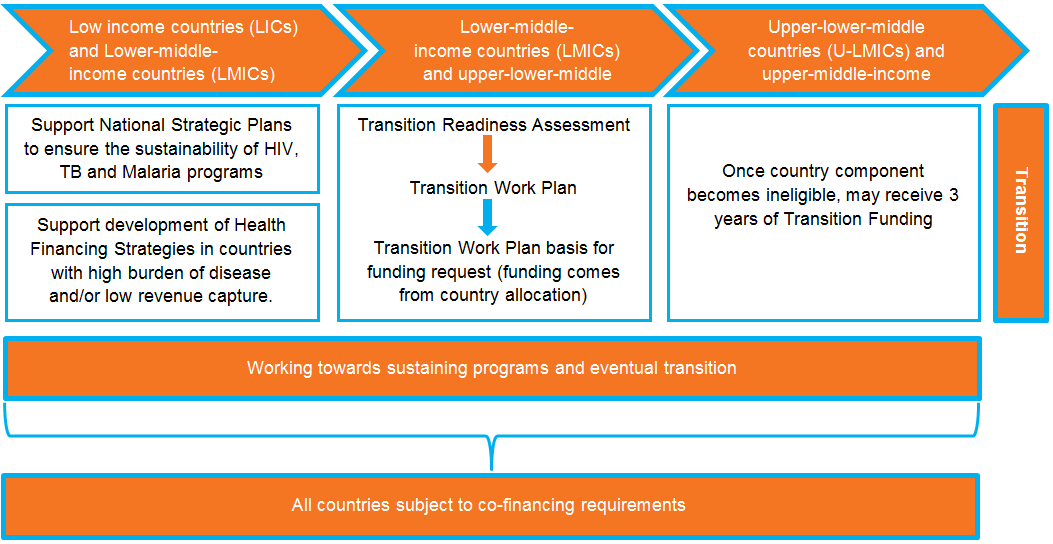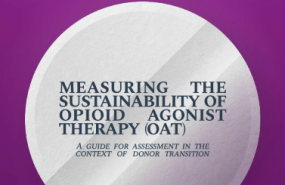GF new policy on sustainability, transition, and co-financing
- 05.05.2016 06:37
- Post Views: 1,499
Board approves new policy on sustainability, transition, and co-financing
The Global Fund has developed a sustainability, transition, and co-financing policy. This policy was approved by the Board at the 35th Board Meeting on 26-27 April 2016 in Abidjan, Côte d’Ivoire. The figure below gives a high-level overview of the new policy.

The sustainability, transition, and co-financing policy is based on four key principles:
- Differentiation – the policy and associated processes should be tailored as much as possible to a country’s income level, epidemiological context, disease burden, human rights and gender contexts, and other context-specific factors.
- Alignment – requirements related to sustainability and transition should be linked with existing national systems and/or processes.
- Predictability – countries should have as much advance notice and time as possible to adequately plan for transition, including accessing resources for the process.
- Flexibility – countries and the Global Fund should have the leeway to adapt certain elements of this policy to better suit a particular country and/or regional context.
The policy encourages countries to be planning for future sustainability challenges, including transition, long before they must do without Global Fund support.
With the new policy, The Global Fund will invest in and support countries to institutionalize sustainability planning in their national health strategies, national strategic plans for the three diseases and health financing plans.
The policy will also introduce transition workplans, which can be used as the basis for funding requests in countries that are preparing for transition. This approach will be paired with support to countries to assess their readiness to transition, both programmatically and financially.
The Fund will also provide direct transition funding once a country becomes ineligible (see article in the same Aidspan newsletter issue on the Fund’s new eligibility policy). Transition funding will be made available for up to one three-year allocation period.
In order to incentivize countries to increase their domestic funding ahead of a transition, the policy also contains new co-financing requirements to ensure that countries are assuming responsibility for interventions for key and vulnerable populations as they move closer to transitioning.
There are other elements of the new sustainability policy which aim to encourage greater prioritization of key populations within the context of transition.
While many aspects of this new policy are welcomed by stakeholders, there are still some uncertainties, which are briefly described in the Aidspan article.
Ivan Varentsov, Global Fund Advocacy Adviser at the Eurasian Harm Reduction Network, noted that previous consultations from the Eastern Europe and Central Asia region identified four critical areas for transition: finance, policy, program, and governance. Others have said transitions need to be considered across six tenets (see GFO article). This shows a gap in the policy which requires further clarity.
The Global Fund Sustainability, Transition and Co-Financing Policy, Board Document GF-B35-04, should be available shortly at www.theglobalfund.org/en/board/meetings/35. A copy of the MSF letter is on file with the author.
Related News
Measuring the sustainability of opioid agonist therapy (OAT) – a guide for assessment in the context of donor transition
This Guide was initiated by the Eurasian Harm Reduction Association to provide countries with an approach and tools to assess their progress in building the sustainability of opioid agonist treatment (OAT) within the context of donor transition. This material builds upon previous assessment frameworks and experiences in measuring sustainability and transition readiness in the areas […] Read moreLaunch of open consultation on Global Fund Strategy development
Global Fund has launched an open consultation on the development of the post-2022 strategy. A background presentation is attached that explains the consultation process and lists a set of questions for reflection and input. The first round of input received by 1 September 2020 will be reviewed by the Global Fund Board’s Strategy Committee in […] Read moreWorkshop: Transition from Global Fund support of HIV and TB programs to national funding: role, opportunities and priorities for civil society in Albania
The workshop “Transition from Global Fund support of HIV and TB programs to national funding: role, opportunities and priorities for civil society in Albania” took place in Tirana, the capital city of Albania, on 23 – 24 of October and gathered 29 participants including civil society representatives, CCM members, representatives of the Global Fund CRG […] Read moreServices for migrants and refugees from Ukraine – HIV/TB care with a focus on key populations
Due to the increasing flows of refugees from Ukraine because of Russia’s invasion of Ukraine, the EECA Regional Platform created a spreadsheet to fill contacts details of face-to-face and online services for refugees and migrants (with a focus on HIV/TB care and key population groups).
Regional Platform – EECA
This web-resource is a part of new regional communication and coordination project “Regional Civil Society and Community Support, Coordination and Communication Platform - EECA”, implemented by Eurasian Harm Reduction Association (EHRA).
Tags
See also
-
EECA’s Regional Platform monthly Newsletter #21, February 2026 26.02.2026 11:56
-
Webinar: Results of the 54th meeting of the Global Fund‘s Board 23.02.2026 10:24
-
EECA’s Regional Platform monthly Newsletter #20, January 2026 27.01.2026 12:58
-
Global Fund Eligibility List 2026 27.01.2026 11:19







